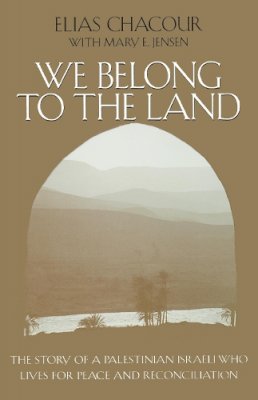
Stock image for illustration purposes only - book cover, edition or condition may vary.
We Belong to the Land: The Story of a Palestinian Israeli Who Lives for Peace and Reconciliation (KESS LIVES JUST & VI)
Elias Chacour
€ 33.84
FREE Delivery in Ireland
Description for We Belong to the Land: The Story of a Palestinian Israeli Who Lives for Peace and Reconciliation (KESS LIVES JUST & VI)
Paperback. A Palestinian Melkite priest tells the story of his life spent working for peace and reconciliation among Israeli Jews, Christians and Muslims. From the destruction of his boyhood village to his efforts to build summer camps for children of all religions, his moving story brings hope. Series: Erma Konya Kess Lives of the Just & Virtuous S. Num Pages: 240 pages. BIC Classification: 1FBH; 3JJ; BG; GTJ; HBJF1; HBLW3. Category: (G) General (US: Trade); (P) Professional & Vocational; (UP) Postgraduate, Research & Scholarly; (UU) Undergraduate. Dimension: 218 x 142 x 15. Weight in Grams: 332.
We Belong to the Land, the gripping autobiography of Nobel Peace Prize nominee Elias Chacour, capture his life's work toward peace and reconciliation for Israeli Jews, Christians, and Muslims.
Nominated several times for the Nobel Peace Prize, world-renowned Palestinian priest, Elias Chacour, narrates the gripping story of his life spent working to achieve peace and reconciliation among Israeli Jews, Christians, and Muslims. From the destruction of his boyhood village and his work as a priest in Galilee to his efforts to build school, libraries, and summer camps for children of all religions, this peacemaker’s moving story brings hope to one of the most complex struggles of our time.
Product Details
Publisher
University of Notre Dame Press
Format
Paperback
Publication date
2015
Series
Erma Konya Kess Lives of the Just & Virtuous S.
Condition
New
Weight
331g
Number of Pages
232
Place of Publication
Notre Dame IN, United States
ISBN
9780268019631
SKU
V9780268019631
Shipping Time
Usually ships in 7 to 11 working days
Ref
99-1
About Elias Chacour
Elias Chacour is the Archbishop of Galilee of the Melkite Greek Catholic Church. He is the author of Blood Brothers and recipient of the Niwano Peace Prize. Mary E. Jensen, the author of many books and articles, lived in Israel for a year of service and study.
Reviews for We Belong to the Land: The Story of a Palestinian Israeli Who Lives for Peace and Reconciliation (KESS LIVES JUST & VI)
“The conflict of being a clergyman and a Palestinian Arab in Israel forms the backdrop for this human drama as the author . . . tries to serve as a spokesperson for fellow Palestinians against what they perceive as injustices imposed on them by a Jewish state . . . This is recommended for those interested in a local perspective on the communal conflict in contemporary Israel.” —Library Journal “ … this book presents a diary of oppression that calls out for justice, a justice that can only be politically mandated. Thus, it belongs to the genre of Liberation Theology in which authentic spirituality is linked with political and social action on behalf of the poor. Elias Chacour has told a story that captures the very best of Christian evangelization…. We Belong to the Land should be required reading in every secondary school, from the West to the Middle East, so that the cycle of racism and violence finally can end.” —Islamic Studies “Chacour’s personal story offers a rare and valuable view inside contemporary Galilee.” —San Francisco Chronicle “A wrenching and determinedly honest book that speaks eloquently and without hatred from the Palestinian side of a tragic conflict.” —Kirkus Reviews “With the active participation of the villagers [of Ibillin], Chacour was able to initiate numerous village projects, such as the construction of public libraries, community centers, and schools, that improved living conditions in the village, provided new opportunities for village youth, and expressed the villagers’ determination to remain on their land ... [This] is not a factual account of the post-1948 history of Israel’s Palestinian community; such accounts have been provided by others. Rather it is a personal portrait that conveys, at once, the journey of one man and that of an entire community to regain identity, integrity, and purpose.” —Middle East Journal
